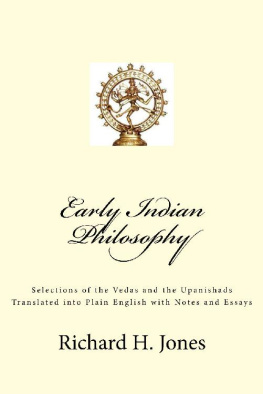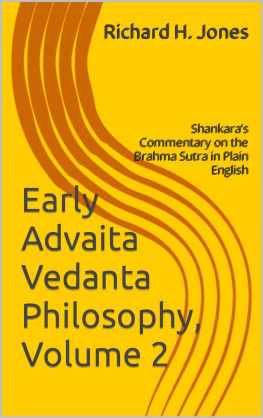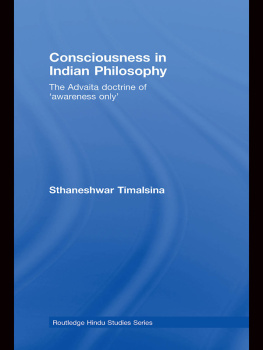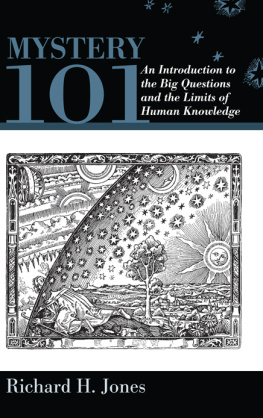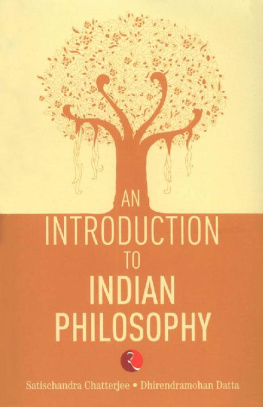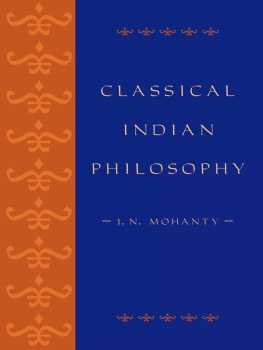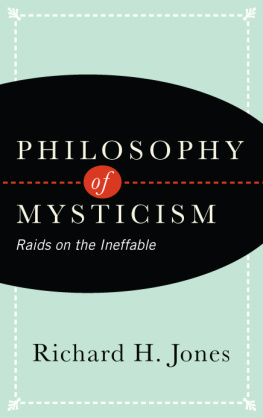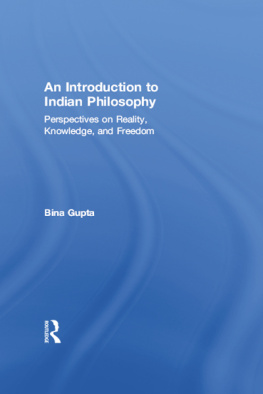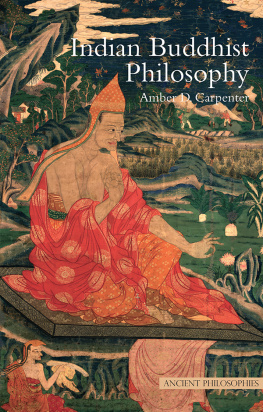Richard Jones - Early Indian Philosophy
Here you can read online Richard Jones - Early Indian Philosophy full text of the book (entire story) in english for free. Download pdf and epub, get meaning, cover and reviews about this ebook. year: 2014, genre: Religion. Description of the work, (preface) as well as reviews are available. Best literature library LitArk.com created for fans of good reading and offers a wide selection of genres:
Romance novel
Science fiction
Adventure
Detective
Science
History
Home and family
Prose
Art
Politics
Computer
Non-fiction
Religion
Business
Children
Humor
Choose a favorite category and find really read worthwhile books. Enjoy immersion in the world of imagination, feel the emotions of the characters or learn something new for yourself, make an fascinating discovery.
- Book:Early Indian Philosophy
- Author:
- Genre:
- Year:2014
- Rating:4 / 5
- Favourites:Add to favourites
- Your mark:
- 80
- 1
- 2
- 3
- 4
- 5
Early Indian Philosophy: summary, description and annotation
We offer to read an annotation, description, summary or preface (depends on what the author of the book "Early Indian Philosophy" wrote himself). If you haven't found the necessary information about the book — write in the comments, we will try to find it.
Early Indian Philosophy — read online for free the complete book (whole text) full work
Below is the text of the book, divided by pages. System saving the place of the last page read, allows you to conveniently read the book "Early Indian Philosophy" online for free, without having to search again every time where you left off. Put a bookmark, and you can go to the page where you finished reading at any time.
Font size:
Interval:
Bookmark:
by
Richard H. Jones
________
Science and Mysticism
Mysticism Examined
Reductionism
Mysticism and Morality
Curing the Philosophers Disease
Time Travel and Harry Potter
Piercing the Veil
Nagarjuna: Buddhisms Most Important Philosopher
For The Glory of God: Christianitys Rolein the Rise and Development of Modern Science
Indian Madhyamaka Buddhist Philosophy After Nagarjuna
One Nation Under God?
The Heart of Buddhism Wisdom
Analysis and the Fullness of RealityPhilosophy of Mysticism
The Vedas and the Upanishads
Translated into Plain English
with Notes and Essays
Richard H. Jones
Jackson Square BooksNew York2014
Printed in the United States of America
Copyright 2014 Richard H. Jones
All Rights Reserved
Library of Congress Cataloging-in-Publication Data
Early Indian Philosophy / translations with notes and essays by Richard H. Jones.Includes bibliographical references and index.
ISBN-10: 149910801X
ISBN-13: 978-1499108019
1.1.
I. TranslationsII. EssaysReferences and Further Reading.................................... 221iii
AU Aitareya Upanishad
AV Atharva Veda
BU Brihadaranyaka UpanishadCU Chandogya UpanishadIU Isha Upanishad
KaU Katha Upanishad
KeU Kena Upanishad
KsU Kaushitaki UpanishadMaiU Maitri Upanishad
ManU Mandukya UpanishadMunU Mundaka UpanishadPU Prashna Upanishad
RV Rig Veda
SB Shatapatha BrahmanaSU Shvetashvatara UpanishadTU Taittiriya Upanishad
This book is about the beginnings of philosophy in India. Thus, the firstquestion is: was there in fact philosophy in the classical Western sense ofthe term in traditional India? Antony Flew famously claimed: There is nophilosophy East of the Suez worthy of consideration. And it is true thatsimply because Indian texts have metaphysical and ethical material that is ofphilosophical interest to us does not mean that the Indians arrived at theirpositions through philosophical reflection. But if the aim of philosophy is, inWilfred Sellars words, to understand how things in the broadest possiblesense of the term hang together in the broadest possible sense of the term,then there certainly has been philosophy in India. It also began fairly earlywith reflections, not on questions arising from the nature of science ormathematics, but on their practice of ritual (see Staal 1988). This began in theBrahmanas perhaps as early as 800 BCE. Even in the final hymns of the earlierRig Veda there is questioning and tentative speculation about the origin ofthe universe. Skepticism about the gods was expressed even earlier.
The reflection in these texts is driven by rational questioning and doubtand certainly not by any dogma. The search for a single cause or source ofeverything is certainly philosophical in nature, as is the centrality of cultivating knowledge based on direct experience and reflection. The doctrinesare advanced tentatively and are grounded in arguments and experience. Infact, the early Indian philosophical reflection predates the Greeks and isperhaps the earliest such reflection recorded in history. There may have beenno Indian Socrates, although there are dialogs in the Upanishads with peoplepersistently questioning the nature of a human being and the world. Someconceptual analysis reminiscent of philosophical linguistic analysis can alsobe found later among Indian grammarians and in the Mimamsa school thatstudied the ritual. All in all, the term philosophy in the Western sense doesapply to some Indian thought (also see Mohanty 1992, 1993: 313-30).
Although the thought is expressed in the form of poetic hymns forrituals, it still reflects genuine philosophical reflection based on reasoningand is not advanced with the confidence of mythology or religious dogma.
vvi~Early Indian Philosophy~
(This is not to deny that there is much that we would consider mythologicaleven in the Upanishads and that some ideas appear irrational to us today.)These thinkers were concerned with the reality behind appearances and theultimate nature of a human being and of the world as a whole, leading to theUpanishads asking By knowing what does all of this world become known?(MunU 1.1.3). The earliest philosophical thought may have been only at thelevel of sophistication of the Pre-Socratic Greeks and not contain developedtheories. But the Greeks may have gotten the idea of skepticism from intercultural contacts with India, e.g., the philosophers in Alexander the Greatstrain discussing matters with Jaina monks. (See McEvilley 2002 for a defenseof the claim that the Greeks got many more ideas from India or a commonMiddle East source.) And the resulting texts are more accessible to Westerners than is, say, Indian music: the questions being asked and the resultinganswers and doubts resonate more universally.
That the Indians ended up focusing more on the mind than did the PreSocratic Greeks does not make their reflection any less philosophical.Materialists (the Lokayatas, Charvakas, Nastikes, and Ajivikas) and skepticsabout life after death such as Samjaya influenced Indian thought at the timeof the Buddha. Nor do the facts that mysticism fed the speculation and thatthe Indians interest was in clarifying mystical matters rather than scientificones disqualify it from being a rational inquiry into the nature of a humanbeing or the world or how to live. The approach was still a matter of philosophical reflection. (Contrary to popular opinion, mystics can be rational intheir thoughts and actions. See Jones 2014: chap. 7.) Philosophy in Greece alsostarted as contemplation informing a way of life with the question of howto live the best possible life, not as an abstract, disinterested, intellectualpursuit of the love of wisdom (Gk., philo-sophia) for its own sake. Thatsome Upanishads end by claiming that the teaching was ultimately revealedby the god Brahma or Prajapati does not change the fact that the actualteachings themselves are presented as based on reasoning and not presentedas if the doctrines must be accepted on the basis of revelation the requisitereligious scaffolding for any culture at that time does not alter the philosophical nature and substance of the arguments. Nor does the fact that Indianspeculation never disassociated itself entirely from religious traditions andsoteriological goals disqualify it as philosophy. In the classical West,philosophy was the handmaiden of Christian and Islamic theology for morethan a millennium and in fact thrived as such.
~Preface~viiThe Problem of TranslationThe intended audience for this book is the general educated publicinterested in philosophy, not historians of Indic culture. Thus, the objectivehere is to glean the philosophical content of these works and to make itintelligible to the modern reader. The translations here will attempt topreserve the meaning of the Indian texts but not their form or the poeticquality or even the flavor of the Sanskrit. Words and phrases have beenadded or deleted, pronouns have been identified, and the grammar changedwhen necessary to make the sense of a passage clear. Some passages havebeen abbreviated. Thus, while most of the translation here is still fairly literal,some is closer to paraphrasing. (One recent English translation of the Upanishads Patrick Olivelles [1996a] sometimes goes even further in thisregard. From it, one would not even know that the Upanishads werecomposed in a different era and culture.) Such translations need not distortphilosophical points and may in fact clarify them. More than just philosophical passages has been included when needed to provide context, and interpretative material has been added in parentheses.
Font size:
Interval:
Bookmark:
Similar books «Early Indian Philosophy»
Look at similar books to Early Indian Philosophy. We have selected literature similar in name and meaning in the hope of providing readers with more options to find new, interesting, not yet read works.
Discussion, reviews of the book Early Indian Philosophy and just readers' own opinions. Leave your comments, write what you think about the work, its meaning or the main characters. Specify what exactly you liked and what you didn't like, and why you think so.

